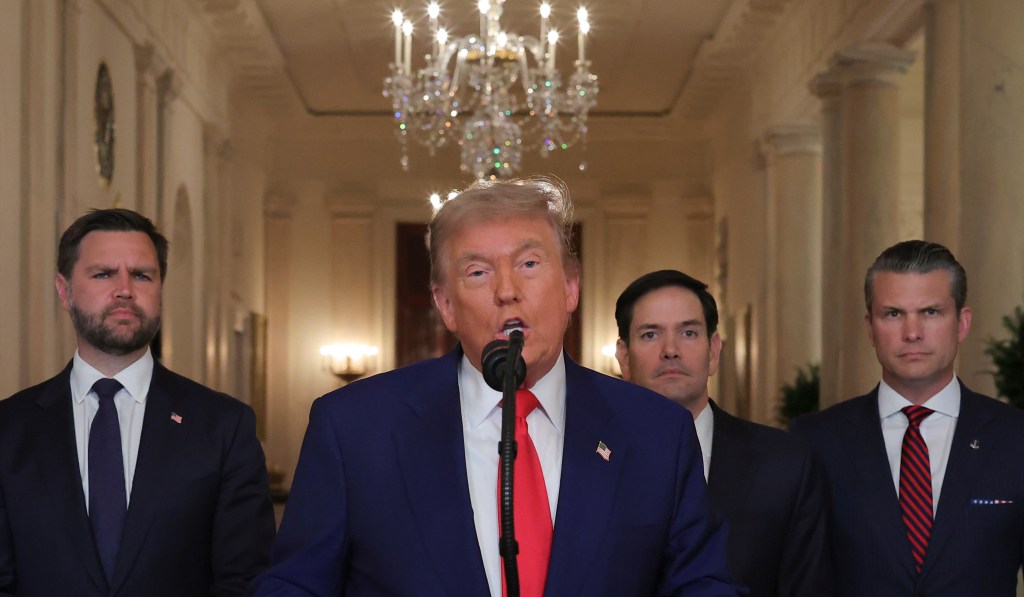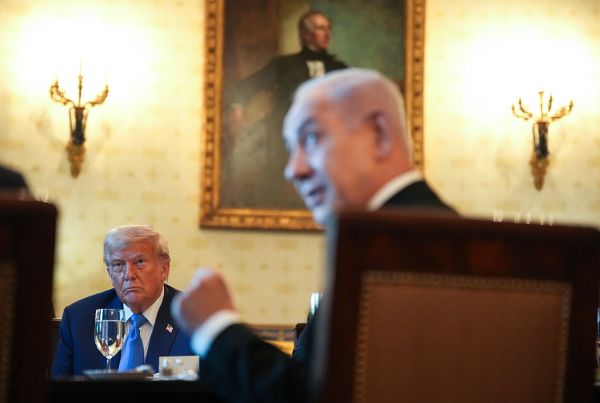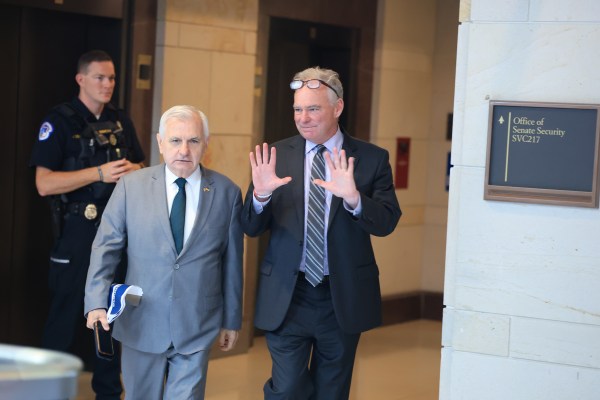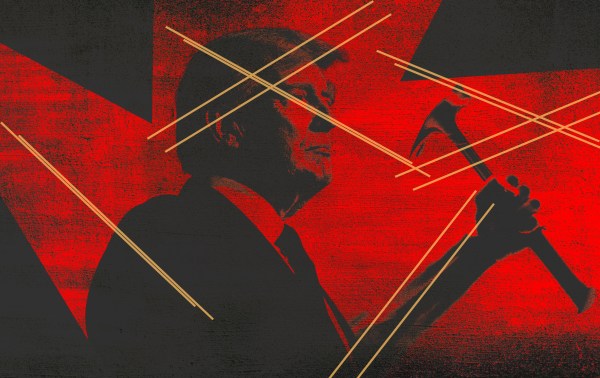President Donald Trump briefly spoke to the nation from the White House on Saturday night, flanked by two of his top Cabinet-level lieutenants: J.D. Vance and Marco Rubio. While Trump laid out how the U.S. mission to destroy three of Iran’s most important nuclear sites had been a “spectacular military success,” the difference in body language between Vice President Vance and Secretary of State Rubio was noticeable.
Vance, wearing a dark blue tie in contrast to Trump’s bright red one, stood behind the president’s right shoulder, his hands clasped in front of him. Wearing a more muted red tie, Rubio stood in much the same way behind Trump’s left shoulder. (Secretary of Defense Pete Hegseth, the odd man out of this tableau, momentarily took his place directly behind the president before moving to stand awkwardly on Rubio’s left side. His tie was also red.)
And while Rubio kept a neutral look on his face and stared straight forward, Vance affixed his stone-faced gaze directly on Trump for most of the three-and-a-half-minute speech. You could be forgiven for assuming both men were imagining themselves in Trump’s position for this consequential announcement.
The Iran strike has not merely provided a stage for some White House wannabes in the administration to look and act presidential. As prominent personalities within Trump’s MAGA movement split over the president’s decision to approve the operation, the seeds of an intra-party fight about American military intervention are being sown. What are the principles by which a president can and should use force? Should military action be used preemptively? Can a hawk be MAGA? A dove? Those arguments could be happening on a debate stage in Iowa or New Hampshire sooner than you think, defining the trajectory of the Republican Party’s foreign and national security policy for decades to come.
And it may be that those two men on either side of Trump could help define the contours of the battle for MAGA’s mantle on foreign policy and more. Indeed, it’s been the assumption in Washington since the beginning of this year that Vance and Rubio are considering launching their own presidential bids from their perches in the administration. But as he often does, the president himself said the quiet part out loud, elevating the two as potential heirs apparent during an interview last month.
“You look at Marco, you look at J.D. Vance, who’s fantastic,” Trump said when asked about the future of the MAGA movement after his presidency.
Publicly, it’s been difficult to find any daylight between Vance and Rubio. Both spoke separately at a gala for the economic populist American Compass organization earlier this month, and as Politico put it, each “lavished praise on one another” as they echoed similar talking points about the growing political salience of the reindustrialization proposals of the Trump administration. And privately, I’m told, Vance and Rubio are the two Trump Cabinet members with the closest and most collegial relationship with each other.
As long as both are serving this president, they’ll be reading from the same Trumpian hymnal. Yet Vance and Rubio represent poles within the spectrum of MAGA foreign policy, with the former a staunch skeptic of American involvement in foreign wars and the latter a reformed hawk who now advocates for an “America First” foreign policy. Under Trump, they may find their way to the same conclusion in support of the administration, but their starting points remain very different.
A case in point: Both Vance and Rubio have expressed their support for last weekend’s strike, but their defenses of the president’s actions have taken on their own flavor that, like their appearances at the White House, suggest some fundamental differences between the two Republican leaders.
“We’re not at war with Iran … we’re at war with Iran’s nuclear program,” Vance said Sunday to anchor Jonathan Karl on ABC News’ This Week.
On Meet the Press, he contrasted this action with the past two decades of American military action in the Middle East. “The difference is that back then we had dumb presidents and now we have a president who actually knows how to accomplish America’s national security objectives. So this is not going to be some long, drawn-out thing,” Vance told NBC News’ Kristen Welker.
Rubio, meanwhile, was more open-ended about what American involvement might look like, depending on Iran’s reaction to the strike. “If they choose the path of diplomacy, we’re ready,” he told Margaret Brennan of CBS News on Face the Nation. “If they choose another route, then there will be consequences for that.”
And to Fox News host Maria Bartiromo, Rubio was blunt that the strike revealed “the game is up” for Iran. “They’re not going to play President Trump, and they found out last night that when he says he’s going to do something, he’ll do it,” he said.
Each man voiced the opposing sides of Trump’s own foreign policy posture: the revulsion to drawn-out, hopeless conflicts versus the utility of strong and decisive American power. The success of the administration’s subsequent actions with Iran and in the Middle East will do a great deal to determine where Republican primary voters will be leaning in three years.
The X factor in this, as it always is in the Trump era, is that Trump himself moves in unpredictable directions that can make proper positioning a difficult task for his would-be successors. For example, the president’s response to Israel’s initial attack on Iranian nuclear sites eight days before he ordered his strike was caution, manifested in a terse statement from Rubio noting that Israel took “unilateral action” without American involvement. By the next day, with the resounding success of the initial round of attacks more clear, Trump was trying to claim partial credit.
Which Republicans’ approach to foreign policy—let alone domestic policy, economics and trade, immigration, and health care—will look the shiniest once primary voters begin registering their preference in early 2028 is a mystery. But make no mistake: Begun, the next Republican presidential primary has.










Please note that we at The Dispatch hold ourselves, our work, and our commenters to a higher standard than other places on the internet. We welcome comments that foster genuine debate or discussion—including comments critical of us or our work—but responses that include ad hominem attacks on fellow Dispatch members or are intended to stoke fear and anger may be moderated.
With your membership, you only have the ability to comment on The Morning Dispatch articles. Consider upgrading to join the conversation everywhere.